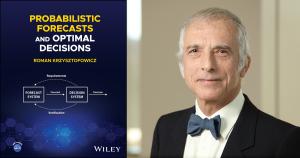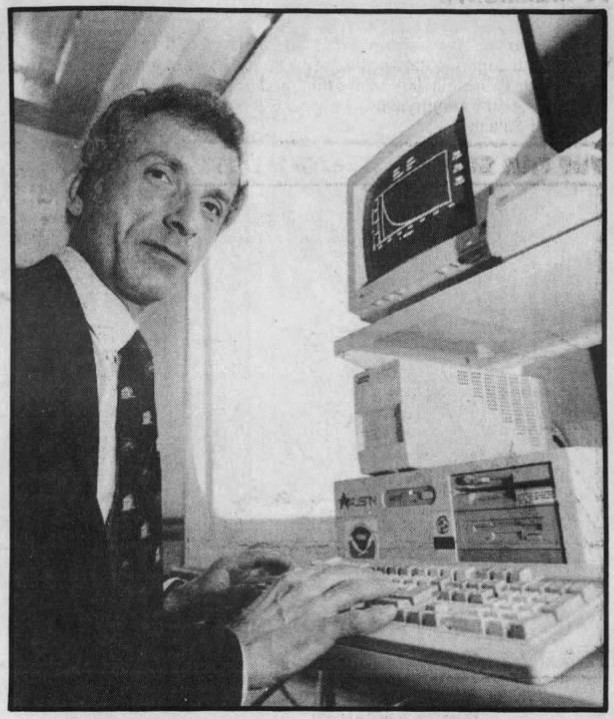
At the outset of his career — before he developed a model for high-stakes decision-making, swapped ideas with Nobel laureates, or lectured for NATO — Roman Krzysztofowicz used his love of math to study the flow of water.
It was the early 1970s, and Krzysztofowicz (pronounced: “ksh-ish-toffo-vitch”) was a young research engineer in his native Poland, working as a hydrologist with Cracow’s Institute for Meteorology. His field was one of the first to turn to computational tools, and he’d gotten his hands on a Soviet-made mainframe computer.
“We learned Assembler, writing in Cyrillic letters,” he recalled with a smile during a recent interview. “And I knew if I could write a perfect program in Assembler in Cyrillic, then I could learn to code any problem in any higher-level programming language.”
It’s not until you can actually code mathematical expressions for a computer that you begin to understand how mathematics works, and vice versa.
It was a format he’d use for the decades that followed: using emerging technology to study the mathematical modeling of probabilistic forecast systems and optimal decision systems.
Now Krzysztofowicz, a professor of systems engineering in the University of Virginia’s School of Engineering and Applied Science, is a widely recognized global expert on the science of decision-making and the author of a new book from Wiley Publishing, “Probabilistic Forecasts and Optimal Decisions.” It ties together decades of his research — more than 180 publications — into a text for advanced undergraduate and graduate students.
“Mathematics and computational science, they go hand in hand,” he said. “It’s not until you can actually code mathematical expressions for a computer that you begin to understand how mathematics works, and vice versa.”
An Early Interest
Krzysztofowicz arrived in the United States in 1974 to pursue a doctorate at the University of Arizona. Though he’d come to build on his career as a hydrologist, he soon found himself tempted by a new emerging field of study: systems engineering.
“Arizona’s systems engineering department was one of the first in the world, though I didn’t realize it at the time,” he said. “I took some courses in the department, and I found myself really enjoying the mathematics again, just as I had as a child.”
His studies began to drift toward the mathematical problems inherent in complex systems, and his new university home had new technology he could use: third-generation mainframe computers from IBM and Control Data Corp. The programming languages he’d learned in Poland paid off.
Even before finishing his doctorate and joining the faculty at Arizona, Krzysztofowicz won a research grant from the National Science Foundation — a relationship he’d maintain his entire career. When Massachusetts Institute of Technology offered him a job one year later, he accepted.
“I realized that my home wasn’t in classical engineering,” he said. “I was really interested in developing mathematics for systems modeling, and I was especially interested in decision theory, and then in forecasting theory. It was my calling.”
Recognizing and Quantifying Uncertainty
Big decisions — such as Krzysztofowicz’s decision to join UVA from MIT in 1982 — can be analyzed using math, but that doesn’t mean they are straightforward. Accounting for uncertainty is one of the biggest challenges of rational decision making, he said.
It requires the assessment of probabilities based not only on data but also on qualitative information. This calls for human judgment — one of the necessary inputs into forecast and decision models.
Krzysztofowicz credits his long tenure at UVA in part to Tom Sheridan, a famed scholar at MIT and a friend and mentor who was also interested in risk analysis and human decisions. In his own research, Sheridan looked at the human factors that contributed to the Three Mile Island nuclear accident and was head of an investigative committee afterward.
“Tom knew that I was looking for opportunities and told me about the University of Virginia, which he said had an up-and-coming systems engineering department,” Krzysztofowicz recalled. “I studied the upper south -- its history, geography, climate -- and then visited. My impression was that the University was better than its actual rankings at the time.”
Around the time he joined UVA, the field of decision theory was rapidly expanding, and Krzysztofowicz found himself intrigued by an upcoming conference, the Foundations of Utility and Risk theories, or FUR.
I was interested in developing mathematics for systems modeling, especially in decision theory, and then in forecasting theory. It was my calling.
At the time, there were two schools of decision theory, European and American, he said. The conference attracted the top thinkers in each branch, and it also drew in experts from many fields: economics, statistics, engineering, even philosophy and cognitive psychology.
“This was the frontier of decision theory,” he said. “It was a small group, maybe 100 or less of us gathering every two years. I had a chance to present to some of the top scholars in the world, and met people who had won Nobel prizes in economics, or got them later.”
One of those economists in attendance was John Harsanyi from the University of California, Berkeley, a future Nobel laureate. Krzysztofowicz recalled sitting with Harsanyi in a restaurant during one of the conferences, with Harsanyi using the proverbial cocktail napkin to make a point about accounting for uncertainty principles.
“This is how I delved into the intellectual and scientific basis of decision theory,” he said. “It derives from axioms, known as rationality postulates, and it connects with what Harsanyi called utilitarian ethics for policy decisions, and it also connects with the free market principles of Milton Friedman — another Nobel laureate.”
In the decades that followed, Krzysztofowicz researched prodigiously at UVA, contributing seminal articles to some 11 disciplines and editing the Journal of Hydrology for 12 years. He lectured at the NATO Advanced Study Institutes, trained senior forecasters for the National Weather Service, served as an expert on probabilistic forecasting to the World Meteorological Organization, and consulted for corporations and federal agencies.

Around 2017, as his most recent round of NSF grants wound down, he shifted his scholarly focus from publishing articles to create a textbook that integrates forecasting theory with decision theory, drawing from all the corners of his scholarship. The new book is the result.
Katie Korngiebel, who graduated from UVA Engineering in 2022, used an early version of Krzysztofowicz’s book when she took his class.
“My favorite model was the one which proves the optimal bid to be the fair market value,” she wrote in a review. “I loved the integration of philosophy, economics and statistics.”
A Textbook for the Future
Krzysztofowicz’s book is already for sale in the Harvard Book Store, as well as online through Wiley and others.
He said it is a synthesis of his research across the years and is designed to educate the next generation of scientists and engineers. The theory is supported with real data from pivotal decisions and events, and the text guides students to learn mathematical modeling, judgmental assessment, statistical estimation and numerical calculations — all needed to make probabilistic forecasts and optimal decisions. As an academic subject, Krzysztofowicz said, it is novel.
He views the multidisciplinary nature of the book as a direct result of those conversations with colleagues in the early part of his career, even the napkin math he did with Harsanyi.
“Mathematics is the basis of everything I’ve ever done,” he said.